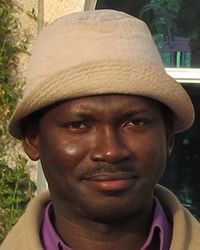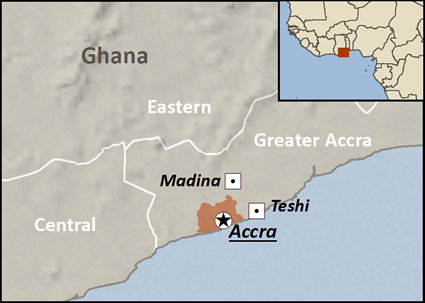Most Manding speakers can trace their roots back to the once great Mali Empire. This empire was created by several Malinke clans in the second millennium. It grew in power in the thirteenth century under the rule of the "lion king," Sundiata, who unified the kingdom and began to conquer surrounding peoples.
During the 16th, 17th and 18th centuries as many as a third of the Mandinka population were shipped to the Americas as slaves. A significant portion of the African-Americans in the United States are descended from the Mandinka people. The majority of the Mandinka were still animists at the beginning of the 18th century, but today most practice Islam mixed with traditional beliefs.
Most the the Mandinka people live in Gambia, Guinea-Bissau, and especially Senegal. A smaller number live in other West African countries like Ghana.
There are three clear divisions of Mandinka society: free-born, artisans, and slaves. The free-born class, originally comprised of only people of noble birth, now includes farmers, merchants, and Muslim clergy. The artisans consist of blacksmiths, leather craftsmen, and praise singers, or griots. The artisans are generally looked upon with awe and fear because their crafts often involve spiritual rituals. The griots are respected because they are responsible for passing down the oral traditions of the Mandinka. Their rich musical heritage is reflected in the national anthems of four West African nations.
Mandinka villages are fairly autonomous and self-ruled, being led by a chief and group of elders. Mandinkas live in an oral society. Learning is traditionally done through stories, songs, and proverbs. Western education's impact has been minimal. However, more than half the adult population can read the local Arabic script.
Most of the Mandinka are farmers. Peanuts, rice, millet, and sorghum are their main crops. While the Mandinka raise most of their own food, some produce is gathered from the forests. During planting and harvesting seasons, much time is spent in the fields. At other times, the men work in part-time businesses to supplement their incomes. Others raise goats, sheep, bees, and poultry. Cattle are sometimes kept, but only to gain prestige, to use as ritual sacrifices, or to use as a bride price.
Mandinka society is patrilineal (male-dominated) and the smallest social unit is the family. The oldest male serves as the head of the lineage. Clans can be recognized by their symbolic emblems, animals, and plants. If someone travels to another village, he is shown hospitality by the villagers who share his last name.
Mandinka villages are made up of clans, or family groups all having the same name. Each village is surrounded by a wall, and the homes are either round or rectangular. They are made of mud with either thatch or tin roofs. These rural villages have neither electricity nor telephone services. Most of the villagers have never traveled more than five miles from their homes.
Traditionally, the Mandinka men do the heavy farm work, hunt, and fish, while the women cook, clean, care for the children, and help with the farming. They also help the men gather produce from the forests.
Parents formerly arranged their daughters' marriages while the girls were still infants. Today, marriages are still arranged, but not as early. The groom is required to work for the bride's family both before and after the wedding. He must also pay the girl's family a bride price.
The religion practiced among the Mandinka is Islam, though it has been blended with their traditional beliefs, and few know what their rituals mean. It is not uncommon for someone to pray in the mosque then sacrifice a chicken to the village spirit.
Islam is practiced faithfully among the Mandinka. Ritual washing and daily prayers are usually observed; however, very few wear Arab dress, and no women wear veils. Islam has been blended with their traditional beliefs, which involved worshiping the spirits of the land. Today, it is not uncommon for someone to first pray in the village mosque, then sacrifice a chicken to the village spirit.
Most of the Mandinka observe Islamic rituals with little understanding of what they really mean. They view Allah as being the one supreme god. However, they also see him as inaccessible and little concerned with their daily affairs, so they look to their traditional gods for these needs. Many of the Mandinka consult marabouts (Muslim holy men) for healing, protective amulets, or insight into the future.
The Mandinka people need the chance to be free from sin by the blood of Jesus Christ, the only Savior.
Pray for the Lord to raise up a strong disciple making movement to saturate the hearts and minds of the Mandinka people in Ghana and other West African countries.
Pray for God's blessing, strengthening and healing of Mandinka families and communities within this people group through the abundant life Jesus offers to all who call on His name.
Pray for God's blessing on the leaders in this people group, along with their families, and for their communities to welcome and enjoy God's blessing.
Pray for the Lord to multiply the reception and influence of His Word among Mandinka leaders, leading them to love Him with their whole being.
Scripture Prayers for the Mandinka in Ghana.
https://www.encyclopedia.com/humanities/encyclopedias-almanacs-transcripts-and-maps/mandinka
https://www.history.com/news/who-are-the-mandinka
| Profile Source: Keith Carey |

























